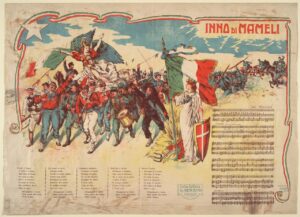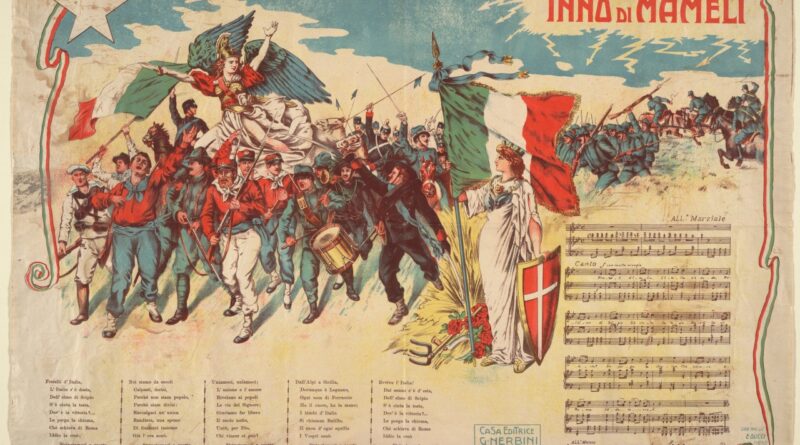Decoding the Meaning of Il Canto degli Italiani: Exploring the Significance of the Italian National Anthem’s Lyrics

Since October 12th 1946, Italy’s national anthem has been “Canto degli Italiani”, composed in Autumn 1847 by Genoese student and patriot Goffredo Mameli and set to music by another Genoese Michele Novaro in Turin.
Born during an era of patriotic fervor in England prior to war against Austria, this hymn contains numerous historical references that require careful reading for better comprehension of its text. Here are our explanations, verse by verse.
Fratelli d’Italia
Italy Awakened; Scipio’s Helmet Bound to Its Crown. (‘Brothers of Italy’).
Publius Cornelius Scipio (253-183 BC), popularly known as the African, was an esteemed Roman general and politician who won an epic victory against Carthaginians and Hannibal at Zama (now Algeria) during 202 BC C in Zama; the battle marked an overwhelming Roman victory, concluding the second Punic war. As Italy prepares for war of independence against Austria, heraldry from Scipio’s helmet symbolizes their valor and bravery during ancient Roman history.
Where is Victory? She bows her head, for she was once Rome’s slave and thus Iddio’s creation. (Livius Iunius Latrofo.)
God made her beautiful. This alludes to an ancient practice of cutting the hair of slave women in order to distinguish them from free women; these latter used long locks as a mark of status and kept it long in order to emphasize their status. Victory was depicted as a woman with long locks; therefore she should offer to have it cut as an act of submission to Rome: Mameli sees this quatrain as the certainty that in any uprising against Austrians Victory must become Italian; she believes it must happen since it’s destiny has decided otherwise.
Join Us In Cohort Prepare To Die In Italy. Bring Us Together In Cohort To Join This Fight Toward Death (Collegati a Coorte/We Are Ready to Die in Italy).
Italy has issued an appeal: ‘Let’s Get Together in a Cohort.” A cohort was an infantry combat unit of the Roman army comprised of 600 men; it comprised one tenth part of each legion. “Let’s Get Together in a Cohort” thus encourages us to come forth quickly to arms, staying united close together while willing to sacrifice lives to gain freedom from foreign oppressors.
At each turn of history we were downtrodden, denigrated, because we are not one people but rather divided amongst ourselves. Now is the time for unity; let us gather under one flag, one hope – now is our moment and be part of an army ready to fight together to ensure Italy’s destiny! For centuries we were taken advantage of, insulted and mocked due to being distinct peoples living among one another and not as one nation. Now is the time to come together – let us unite under one flag, one hope; let us fight in cohort and be united – now is our time, let’s do battle together for Italy! For centuries
Italy has called, reminding the nation to come together under one banner; to unite under a shared ideology for an Italy still divided in 1848 into seven states (Kingdom of Two Sicilies, Papal States, Kingdom of Sardinia, Grand Duchy of Tuscany, Kingdom of Lombardy and Veneto Kingdoms (including Parma Duchy ) as well as Modena Duchy).
Union, Love and Liberty for Italy
Let us unite, love one another, unveil to the peoples the ways of the Lord; proclaim freedom on our native soil: Its Swear our allegiance to Him (God) by swearing to set it free (we call Italy home). And pledge ourselves in an alliance – united we stand; no one can beat us (unity is strength!); Let us pledge together against death (Italia calls). So lets come together, unite in union and liberty: Show the way of the Lord through unveiling his life to all peoples (we) umplut pledge allegiance (Union + Love), reveal his life to all peoples: Pledge alliance = Unitariament + Devotion = Unity + Devotion ==> Let Us join forces, commit ourselves together) until death (or at least until death) whilst standing together against Him/her alone). Join in Cohort = United against Death/rivalry ==>=>adversaire defeated? Join forces because God can only conquer? Stringiamci for Him/Her/We can defeat Anyone… but… Join forces /we stand pledge ourselves against anyone or bring liberty (or our land that our land that belongs; commit ourselves towards setting it free) our land; swear freedom = We Are ready to die For Italy) umplut Ill be ours) To Death is ready). All. Ill be ready…). Let Us join forces and pledge ourselves towards set Freeing it should remain on behalf of one vs We are Ready…, for God can never ever break us? Join hands together until Death will defeat Us umplut Lets… (Unity can defeat US? Its Joint together against All, Whoever opposing in cohort to set free whils and all together: United in unity or simply joining and set freeing for Italy in unity = Our Country is Italy in Cohort’s Land ours only Our Land Italy). And… until death stands; ‘unite ; Let Us Together we stand… until this land and die For Italy… Our land for Italy). So join ranks, We, for it’);
Mameli was an ardent supporter of Mazzini and in this verse he illustrates his political design for “Giovine Italia”, including unifying all Italian States into one republican entity. To “by God” is to see God as someone who stands with those suffering oppression – something which was expressed through Frenchisms that don’t always imprecations but instead provide support.
Legnano to Sicily on Regular Train Service
Legnano’s name can be found everywhere Legnano marks an historic moment: on October 17, 1176, under Alberto da Giussano’s command, Lombardy led by Alberto da Giussano defeated Frederick I of Swabia (Redbeard). Following this defeat, Frederick had no choice but to cede some of his authority to the Lombard cities; they entered into an 1183 peace treaty which acknowledged their autonomy.
Every man of Ferruccio has heart and hand.
Ferruccio
This quote refers to Florence’s heroic defense during its besiegement by Charles V of Habsburg’s imperial army between 12 October 1529 and August 12 30. Captain Francesco Ferrucci was mortally wounded during this siege and killed by Fabrizio Maramaldo, a soldier-of-fortune on Charles V’s payroll whose name became synonymous with “cowardliness” – his last words before dying were: “You killed a dead man!” On August 12th Florentines signed the surrender that brought them back under control of Charles V of Habsburg’s imperial army.
Children from Italy known as Balilla
Are We All Balilla All Italians should honor and recognize the value and courage of the legendary Balilla, the iconic figure who symbolized Genoa’s popular revolt against Austro-Piedmontese coalition: on December 5, 1746 a boy known as Giambattista Perasso threw a stone at an officer, sparking off an outbreak that eventually liberated Genoa from occupation by Austria and Piemont.
Vespers were heard. Let us assemble in one cohort; let us all be ready to die when our time comes in Italy. And the sound of every bell rang for the Vespers service; let us all join together, ready to face death together with all its consequences in Italy. Touted as Vespers was played; let us join together as one cohort; We are ready for death when it comes.
Italy has called this event, “The Sound of Every Ring”, or the “Sound of Each Bell”. Mameli refers to this event, known as the Sicilian Vespers; which occurred after 16 years of French Angevin domination ended when Sicily submitted itself to Aragonese rule on Easter Monday March 31st 1282 and all bells in Palermo tolled out an appeal to revolt against French authority. At that momentous Vespers in Palermo all bells rang simultaneously to encourage revolt.
No longer do mercenary swords dredge up dust; already the Eagle of Austria’s plumes have fallen. Blood of Italy, Parchet blood of Poland: consumed along with Cossack blood but burning its heart: these are signs that all is no more. Let us form a cohort; We’re ready for death as L’Italia calls it. At last!
These mercenary swords have lost their edge. Just look at what has happened since April. They drained away along with its plumes; umplut blood of Italy, Polonia; drunk with Cossack blood but left its heart on November 9th: This marks it out as far.
Let us join in a cohort – We are ready for death as L’Italia calls us;
Italy was in crisis, as Austria under Habsburgs (with its double-headed eagle as imperial symbol) was in decline (sold swords represented mercenary troops who filled its ranks) and Mameli is calling upon Italians one last time to give an end to Austrian dominance with parallelism with Poland (from 1772-1795, Russia (as part of its “Cossack” forces) invaded and oppressed both nations). Bloodshed among oppressed peoples can become inevitable through uprisings against foreign oppressors – both peoples could become one in this struggle against foreign oppressors!
